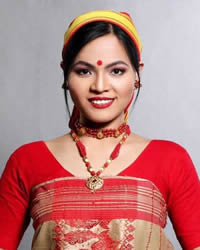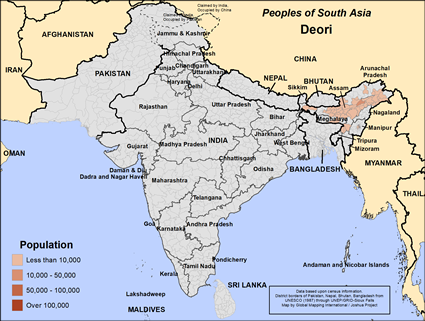There are four different types of Deori clans. Borgoiya or Borgia, Tengaponia, Dibongia. Borgoiya worship Tameshwari devi/ kesai khati (as per Kalika purana it is referred as Dikkaravasini). Tengaponia worship Boliya Baba and Dibongia clan worship Kundi-Mama and the 4th clan is believed to be lost.
The Deori live along the Brahmaputra River, which flows through northeastern India. They are primarily located in the states of Assam, Nagalan, and Arunachal Pradesh. They speak a Tibeto-Burman language that is also called Deori.
The Deori are one of the four divisions of the Chutiya people group and are also related to the Eastern Bodo-Garo. The Bodo were persecuted Mongols who fled into India through Burma and Tibet and settled in the Garo and the Cachar Hills. They were then divided into many clans and acquired different community names, one of which was Deori.
The Deori are unusual in that they have managed to maintain their tribal identity. They are more Mongoloid in appearance than other tribes because they have kept themselves free from racial intermixture and intermarriage with other Bodo tribes. In general, they are ferocious fighters who are optimistic, cheerful and freedom-loving.
Industrial development in the Deori territory is very limited. This is primarily due to the fact that eastern India is somewhat isolated from the rest of India. This region also has a poor transportation system and small local markets. The Deori, therefore, are restricted to agriculture for survival. They ideally grow rice in irrigated fields, although they often resort to shifting cultivation using the slash and burn technique is used to clear their fields. After burning their fields, they plant seeds in the ashes, raise crops on the land for a year or two, then move to a new location where they repeat the process. As a result, the natural hillside vegetation of tropical evergreen forests has been destroyed over wide areas, and a tangle of bamboo has replaced it.
The Deori live in villages that are scattered along riverbanks. Houses are made entirely of bamboo with thatched roofs. They are raised four to six feet off the ground on wooden or bamboo stilts to protect them from floods. The space under the house is used for their goats, pigs, and fowl. Among the Deori, proper hygiene is non-existent.
One of the noted social peculiarities of the Deori is that entire extended family units live under one roof. They enlarge the building as the number of family members increases, until sometimes more than 100 people live in the same house!
The Deori are almost entirely endogamous; that is, they marry within their own tribes. Through this practice, they have maintained their original culture. The groom must pay the traditional bride price to the bride's family. If he is poor, he will offer to work for the bride's family for a specific period of time.
The Deori lineage is patrilineal (lineage and inheritances are passed down through the father). The sons inherit equal shares of the property, and the daughters have no claim. Deori social structure is organized under a village council, whose members are expected to have high moral standards.
They have a community prayer halls which they call THAN ghar. All Deori clans have lineage like Bordeori or Borpujari, Bharali, Medhi etc. To be the priest of the THAN we strictly follow that the person who will hold the post of priest must be from Bordeori lineage or else the post remain vacant and Pujas are done by bringing a priest from another village. They don't use priests from other clans.
They believe in Tameswari Than and wear pure white cloths to Than to offer prayers Tengaponia in Boliya Baba Than.
The Deori people have needs in the areas of education and housing.
Ask the Lord of the harvest to call missionaries who will be willing to work among the Deori.
Pray that God will give the few Deori believers opportunities to share Christ with their own people.
Ask God to raise up prayer teams who will begin breaking up the soil through worship and intercession.
Ask the Lord to soften the hearts of the Deori so that they will be receptive to the gospel.
Ask the Lord to save key leaders in the Deori tribe who will boldly declare the gospel.
Scripture Prayers for the Deori in India.
| Profile Source: Joshua Project |











